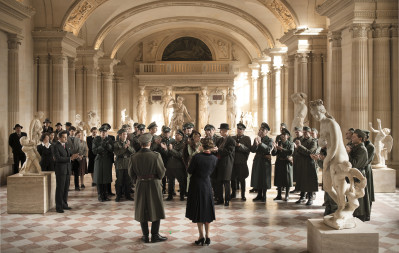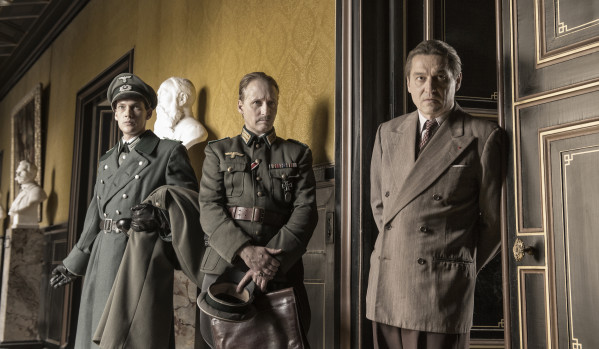REVIEW: ‘Francofonia’ offers musings on intersection of history, art

Aleksandr Sokurov’s Francofonia, currently playing at New York City’s Film Forum, is a beautifully composed and surprisingly intricate film about the unique intersection of art and history in 20th-century Paris. Depicting both historical episodes and reimagined scenes in the fraught history of the French capital, the movie blends archival footage, reenactments and a thoughtful, dreamlike narration to offer questions that seem resoundingly pertinent in today’s society.
Sokurov, quite simply, may have created a masterpiece with Francofonia. At the very least, he has offered a touching study of the consequences of authoritarianism and the sacredness of art. Images of Nazi officers holding Paris siege and debating on what to do with the wonders of the Louvre dominate Francofonia’s narrative, and Sokurov has several reenactments with actors displaying these officers, plus Napoléon Bonaparte (Vincent Nemeth) and Marianne (Johanna Korthals Altes), France’s symbol for liberté, egalité and fraternité.
For viewers, the experience of watching Francofonia can be dizzying. The archival footage is coupled with modern-day creations, and the transitions between the two are sometimes seamless.
There’s also a heavy amount of metafilm in the movie with scenes that portray what appears to be Sokurov in an office while images on a laptop flash by. There’s even shots of assistants introducing a scene with a snap of a Francofonia clapboard.
Louis-Do de Lencquesaint plays Jacques Jaujard, the wartime director of the Louvre, the internationally recognized art museum that holds a host of masterpieces, including the Mona Lisa by Leonardo da Vinci.One panning shot displays the Louvre museum and how it looks today on the banks of the Seine, and then it morphs into a Paris at the time of its founding.
Benjamin Utzerath plays Franz Wolff-Metternich, the Nazis’ emissary to the Louvre. Together Wolff-Metternich and Jaujard strategize on the best ways to preserve the unique treasures of the Louvre during the Nazi occupation of Paris. Surrounding this narrative are depictions of Parisians forced to flee their beloved city; the setting up the new capital in Vichy, France; and wondrous views of the Louvre’s pieces.

Sokurov, the director behind Russian Ark, is not a traditionalist when it comes to his storytelling techniques. He creates a storm and continues to let it spiral and spiral until it encompasses many profound topics, including culture, war, destruction and oppression. If his camera finds poetry in a piece of art, the lens will stay with the painting, so the viewer can appreciate it as well.
Sokurov is also credited with writing and narrating the movie, and his ruminating is one of Francofonia’s highlights. There are some historical setups, allowing the viewer to understand the archival material, but more often the voice asks questions and offers poetic musings on the subject matter.
It is in the narration that Francofonia becomes a film not only about World War II and the destruction of Europe but also about the long history of art and culture losing in their battle against warring factions. It doesn’t take much to delete some of the names in this film and insert some of the present-day conflicts. News stories today focus on the obscene destruction of centuries-old art and architecture in the Middle East at the hands of ISIS, and Sokurov seems to see the connection. What happened to the Louvre in Paris is not a solitary example; it’s part of a larger fabric of negativity overcoming the best qualities of humankind.
By John Soltes / Publisher / John@HollywoodSoapbox.com
- Francofonia
- 2015
- Written and directed by Aleksandr Sokurov
- Starring Louis-Do de Lencquesaing, Benjamin Utzerath, Vincent Nemeth and Johanna Korthals Altes
- Running time: 87 minutes
- Not Rated
- Rating:






Those who want to know more about the events portrayed in the film might want to check out the award-winning book Saving Mona Lisa: The Battle to Protect the Louvre & Its Treasures During World War II. The book explores the interactions between Jaujard and Wolff Metternich in more detail and other layers of how Jaujard and the other curators protected the Louvre’s art throughout the war. Their courage is an inspiring true story of the best equalities of humankind overcoming negativity.